France says Iran sanctions relief depends on release of detained citizens
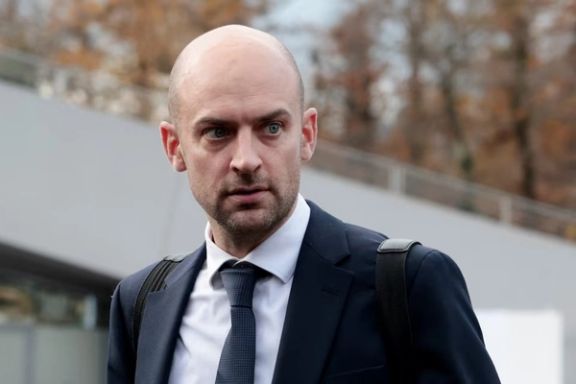
France says Iran's future ties and sanctions relief depend on the release of three French citizens detained in the country, with some held in conditions resembling torture.

France says Iran's future ties and sanctions relief depend on the release of three French citizens detained in the country, with some held in conditions resembling torture.
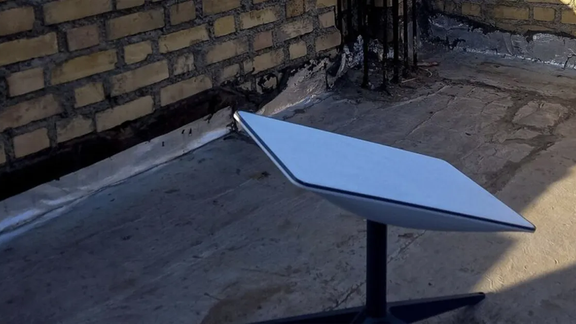
The number of Starlink satellite internet users in Iran has surpassed 100,000, a senior industry official said on Monday, underscoring the keenness of Iranians to defy curbs on their access to the outside world.
Satellite internet usage in the country increased 20-fold in 2024 with over 30,000 unique users contributing to the surge, the head of the Internet and Infrastructure Committee at the E-Commerce Association Pouya Pirhosseinlou said.
"Over 30,000 unique users are utilizing satellite internet, suggesting that the total number of satellite internet users exceeds 100,000," he told news agency ILNA. "This indicates that we will likely witness further growth in the use of this technology in the country in the future."
The primary appeal of Starlink lies in its unrestricted free access and high speed, two features largely absent in Iran, which ranks near the bottom of the global Internet Freedom Index.
Starlink gained prominence in Iran following the 2022 Woman, Life, Freedom protests, which erupted after the death of a young woman, Mahsa Amini, in morality police custody for hijab.
The government responded to the demonstrations with internet blackouts and extensive filtering, prompting many Iranians to turn to satellite services like Starlink for unrestricted online access.
In December, Forbes estimated that 20,000 Iranians were using Starlink despite its official prohibition.
Now, with over 100,000 users, the service has become a critical tool for bypassing censorship and government-imposed disruptions.
The US government’s decision to lift certain export restrictions on internet services to Iran in 2022 enabled billionaire Elon Musk-owned SpaceX to provide Starlink access in the region.
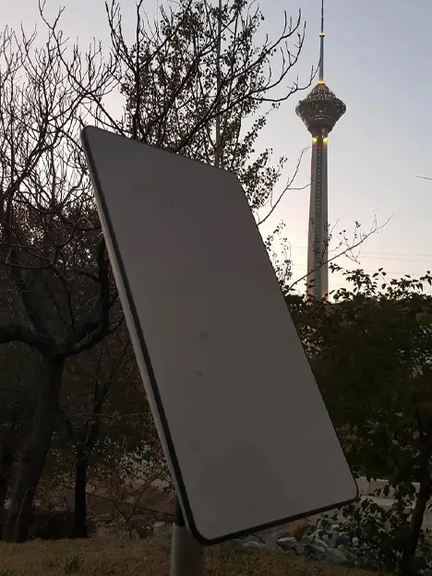
Starlink is prohibited in Iran. Government censors have blocked access to apps such as Telegram, Instagram and X as well, and authorities frequently arrest individuals for online statements deemed anti-Islamic or critical of the Islamic Republic.
Pirhosseinlou acknowledged the benefits of satellite internet but warned of its economic impact: “Using Starlink is the most expensive method of internet access, which disrupts the communications economy, drains hundreds of millions of dollars in foreign currency from the country and diminishes hope for domestic improvements to internet services.”
Despite the high costs, the growing adoption of Starlink reflects dissatisfaction with local alternatives, including Iran’s government-controlled fiber-optic internet.
Meanwhile, Iran's government has lobbied the International Telecommunication Union (ITU) to exclude the country from satellite internet coverage. Efforts to curb Starlink's influence highlight its role as a contentious element in Iran's ongoing struggle between state control and digital freedom.
The rights organization Freedom House ranked Iran as having the world’s third most restrictive internet environment, criticizing the Islamic Republic for criminalizing online dissent in an effort to increase voter turnout and legitimize presidential polls.
"(Authorities) criminalized any content that encouraged election boycotts or protests, or that criticized candidates ... (for) higher voter turnout to make the election seem legitimate, despite the arbitrary disqualification of most candidates," the group said in a report in October.
The expanding reach of Starlink represents a shift in Iran's internet landscape, offering a lifeline for those seeking unrestricted online access amidst heightened governmental control and censorship.

A man has been charged with helping a former British soldier convicted of spying for Iran escape from a London prison, the Metropolitan Police said on Monday.
Imran Chowdhury, 25, from Chingford, a suburban area in northeast London near Epping Forest, is accused of assisting Daniel Khalife after his escape from Wandsworth prison in September 2023, which triggered a nationwide search before Khalife was recaptured three days later.
“Chowdhury was arrested in January 2024 and charged in December with one count of assisting an escaped prisoner,” police said.
Khalife had escaped the prison by clinging onto the bottom of a food delivery van. Police did not specify how Chowdhury allegedly assisted Khalife in his prison escape.

The accused is set to appear at Westminster Magistrates' Court on January 7.
Police also confirmed that no further action will be taken against an unnamed woman arrested in February 2024 in connection with the case.
In November last year, Khalife was found guilty of espionage for Iran, including collecting sensitive information for individuals linked to the Islamic Revolutionary Guard Corps (IRGC) and gathering the names of special forces personnel.
He was convicted on two counts related to espionage in violation of Britain’s Official Secrets Act and Terrorism Act but acquitted of charges related to a bomb hoax.
During his trial, the court heard that Khalife initiated contact with Iranian intelligence officers after learning he could not obtain developed vetting, a high-level UK security clearance, because his mother was born in Iran.
Khalife said that he later approached MI5, offering to become a double agent. He said he believed this move would be welcome, but described his arrest as a shocking experience, likening it to a "punch in the face."
He also said that drew inspiration from the television series Homeland, which portrays complex espionage scenarios involving undercover agents and double agents.
"I had seen one of the characters in the programme had actually falsely defected to a particular country and utilised that position to further the national security interests of that character's country," he told the court last year.
Prosecutors dismissed Khalife’s claim that he aspired to work as a double agent for British security services, describing it as “a cynical game.” They argued that Khalife collected “a very large body of restricted and classified material.”
Khalife, who grew up in Kingston, south-west London, joined the British Army in September 2018.
The prosecution said that Khalife took a photograph of a handwritten list of 15 soldiers, including some serving in the Special Air Service (SAS) and Special Boat Service (SBS). In June 2021, he extracted details from an internal promotions spreadsheet shared in a WhatsApp group called “Brew Room Boys.” He then accessed an internal HR system to retrieve the first names of the soldiers, the court was told.
"He was clearly researching and gathering and recording that information," Mark Heywood KC for the prosecution said during a trial session in October last year.
Prosecutors said Khalife began contact with Iranian intelligence in 2019, creating a contact with Iran’s +98 dialing code. By August 2020, he was messaging a contact saved as “David Smith,” discussing internal military systems and saying he would remain in the military for "25+ years" unless instructed otherwise.
According to the prosecution, Khalife traveled to Istanbul in August 2020 intending to meet Iranian operatives but stayed at a hotel after the plans fell through. They also alleged that in early 2021, while stationed at Fort Hood in Texas, Khalife remained in contact with an Iranian handler.
Khalife was first arrested on 6 January 2022 at a barracks in Stafford where police officers executed a search warrant. He will be sentenced later this year.
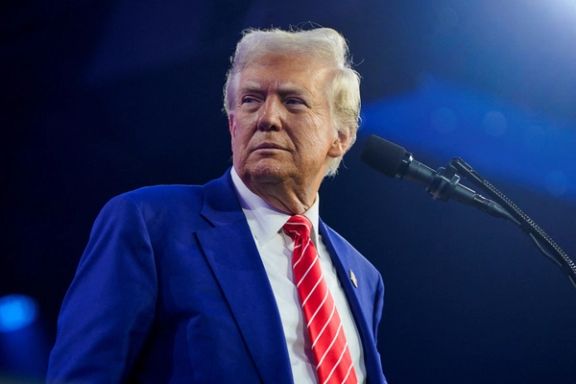
US President Donald Trump left Israeli Minister Ron Dermer with the impression that he was likely to support an Israeli military strike on Iran’s nuclear facilities—or even order a US strike—after a November meeting, Axios reported citing two sources.
Dermer met Trump at his Mar-a-Lago residence in Florida in November, Axios reported at the time, saying the aim of the meeting was for the Netanyahu confidant to convey messages regarding Israel’s plans for Gaza, Lebanon and Iran.
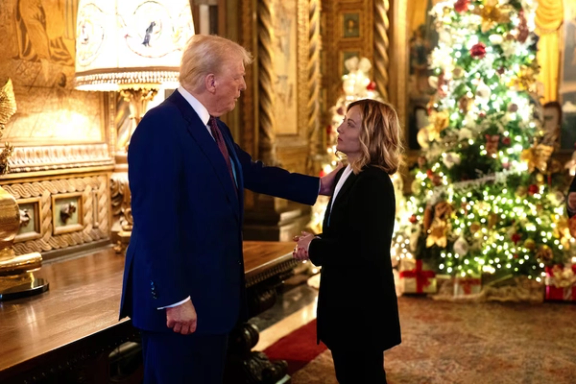
US President-elect Donald Trump has agreed to temporarily halt the extradition of an Iranian detained in Milan, Italian media said on Monday after Iran International reported that Tehran tied an Italian reporter’s release to the Iranian detainee’s freedom.
Mohammad Abedini Najafabadi, accused of transferring drone technology to Iran, was arrested at Milan Airport on a US warrant. Washington says the technology was used in an attack in February near the Jordan-Syria border that killed three American soldiers, an assertion Iran denies.
“The freezing of the United States' extradition request to Italy for Iranian Mohammad Abedini-Najafabadi, detained since December 16 in Milan's Opera prison on an American warrant, was the primary objective of Prime Minister Giorgia Meloni's swift visit to Mar-a-Lago, the Florida residence of US President-elect Donald Trump, who is set to be sworn in on January 20,” wrote the Italian newspaper Il Giornale on Monday.
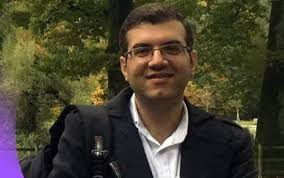
The suspension gives Italy a brief window to negotiate the release of Italian journalist Cecilia Sala, detained in Tehran since December 19.
“The tipping point may come on January 15, when the Court of Appeal in Milan is set to rule on the request for house arrest for Abedini. This decision could allow the Italian government to advocate for a similar measure for Sala,” added Il Giornale.
Tehran made clear to Rome that the freedom of the Italian reporter detained in Iran depends on Italy's release of Abedini, a source familiar with discussions between the journalist's family and the Italian government told Iran International.
Iran, the source said, is prepared to free Sala “on humanitarian grounds" if the Italian government drops the extradition proceedings against Abedini and grants his release from Milan's brooding La Opera prison.
Iran denies link between Sala and Abedini cases
Tehran has denied any connection between the two detentions. Iranian Ministry of Foreign Affairs spokesperson Esmaeil Baghaei said on Monday, “These two issues are completely unrelated. The Italian journalist was detained for violating Iranian laws, while the Iranian individual is in custody for circumventing US sanctions.”
The Iranian embassy in Rome also claimed Sala is being treated humanely, while urging Italy to expedite action for Abedini’s release.

Tensions over Sala’s detention escalated after the Italian foreign ministry summoned Iran’s ambassador in Rome, Mohammadreza Sabouri, on January 2 to demand her immediate release.
Domestically, Prime Minister Giorgia Meloni’s diplomatic efforts have drawn praise. Deputy Prime Minister Matteo Salvini posted on X: “Well done Giorgia Meloni for visiting Donald Trump to talk about peace, industrial and commercial cooperation, security, and the freeing of Cecilia Sala.”
Milan’s Chief Prosecutor has opposed Abedini’s conditional release, while Meloni is scheduled to meet US President Joe Biden in Rome on January 12 to further discuss Sala’s detention.
The temporary suspension of Abedini’s extradition shows the high stakes for Meloni’s government torn between Washington and Tehran as it navigates the complexities of securing Sala's release, addressing what rights groups and nations such as France have branded as Iran’s 'state hostage-taking'.

French President Emmanuel Macron warned on Monday that Iran's nuclear program is nearing the point of no return, stressing the need for Paris to engage in strategic discussions with US President Donald Trump's administration about Tehran.
Macron urged the European parties to the lapsed 2015 nuclear deal with Tehran to consider reimposing sanctions, he told an annual conference with French ambassadors to outline foreign policy objectives in 2025,
"The acceleration of the nuclear program leads us nearly to the point of no return,” he said, describing Iran as the main strategic and security challenge for France and Europe.
Iran says its uranium enrichment program is for peaceful purposes but has accelerated activity since US President-elect Donald Trump withdrew from the 2015 nuclear deal - officially known as the Joint Comprehensive Plan of Action (JCPOA) - during his first term and reimposed sanctions on Tehran.
“Remember, when the United States decided to denounce the JCPOA, which they themselves had promoted, France had a simple view: we must move towards a broader agreement. This is our strategy today,” Macron added.
Last month, European powers France, Germany, and Britain warned that Iran’s actions had further eroded the agreement, noting that Tehran’s stockpile of highly enriched uranium has no credible civilian justification.
In December, the head of the UN nuclear watchdog reported that Iran was dramatically advancing enrichment close to the 90% purity needed only for weapons-grade material.
The three European nations, co-signatories of the 2015 accord, had brokered the deal under which Iran agreed to limit enrichment in exchange for the lifting sanctions. With the sanctions reimposed, Iran saw little to no incentive to keep its part of the bargain.
French, German, and British diplomats are scheduled to meet with Iranian counterparts on January 13 for a follow-up to last month’s talks, aimed at exploring serious negotiations in the coming months to ease tensions with Tehran as Trump prepares to return to the White House on January 20.
"In the coming months we will have to ask ourselves whether to use ... the mechanism to restore sanctions," Macron said, referring to October 2025 when the JCPOA formally expires.
Macron also mentioned Iran's ballistic missiles and support for Russia, labeling them threats to Europe and calling for diplomacy with Trump after he took office.
“Its (Iran’s) ballistic missile program threatens European soil and our interests. Iran is already involved in Russia's war against Ukraine through clear and fully identified military support.”
Warning that Iran’s use of terrorism continues throughout the world, he said, “Tehran’s support for dangerous groups across all conflict zones in the Middle East and its attempts to establish a presence in Africa amplify this danger through its so-called proxies.”
"The situation of our compatriots held hostage in Iran is simply unacceptable; they have been unjustly detained for several years, in undignified conditions that, for some, fall within the definition of torture under international law," French Foreign Minister Jean-Noel Barrot said Tuesday.
He added, "I say to the Iranian authorities: our hostages must be released. Our bilateral relations and the future of sanctions depend on it."
Rights groups say three French citizens—Cécile Kohler, Jacques Paris, and Louis Arnaud—have been arbitrarily imprisoned without due process, with Kohler and Paris held for over two years.
Arnaud, a banking consultant, was sentenced to five years in prison by an Iranian court in November 2023.
Kohler, a teacher of contemporary French literature, was arbitrarily detained along with her partner Paris during a trip to Iran on charges of “espionage.”
Both Paris and Kohler were subject to inhumane detention conditions including on state TV.